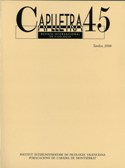La voluntat de comunicar com a objecte primordial en l'aprenentatge d'una L2
DOI:
https://doi.org/10.7203/caplletra.45.4795Keywords:
learning goals, second language, language contact, attitudes, prejudices, motivations, willingness to communicate, communicative competence, communicative behaviour, communicative confidence, teacher training, educational policies, linguistic centre proje Abstract
Abstract
Although evidence has shown that psychosocial factors have a decisive influence in second language learning, it has not been highlighted the importance they have regarding educational practice, the design of learning programs or teacher training.
The model known as Willingness to Communicate, developed by MacIntyre et al. (1998) from numerous empirical works, points at the factors that favor authentic use in the learning of a second language and the relationships among them. The goal of
a language course can not be limited to developing communicative competence but has to be aimed at increasing the willingness to communicate actively. Following this theoretical model, one of its authors, Zoltán Dörnyei (2001), has devoted one of his books to the development of practical strategies of motivation in the language classroom. These approaches are specially useful for contexts of linguistic concurrence like ours, especially at a moment in which school multilingualism is promoted.
 Downloads
Downloads
Downloads
Published
How to Cite
-
Abstract361
-
PDF (Català)196
Issue
Section
License
Authors submitting work to Caplletra for publication must be the legitimate holder of the usage rights. Legitimacy for the purposes of publishing the work must also include images, tables, diagrams and any other materials that may complement the text, whether they are the author of such material or not.
Copyright: on publishing their work in the journal, the author grants Caplletra. Revista Internacional de Filologia usage rights (reproduction, distribution and public communication) for both the paper printed version and for the electronic version.
All work published in Caplletra is covered by the Creative Commons license type Attribution-NonCommercial-NoDerivatives 4.0 (CC BY-NC-ND 4.0).
RESPONSABILITY
Caplletra. Revista Internacional de Filologia does not necessarily identify with the points of view expressed in the papers it publishes.
Caplletra. Revista Internacional de Filologia accepts no responsibility whatsoever for any eventual infringement of intellectual property rights on the part of authors.






